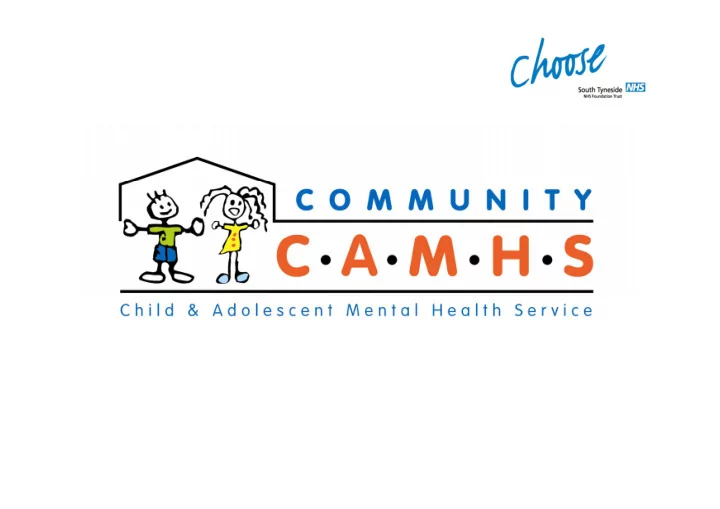

The 4-tier model for CAMHS Very specialist Services, often Tier 4 children away from home Specialist Multi-disciplinary Tier 3 Teams Individual Professionals Trained Tier 2 in Children and Young People’s Mental Health eg Psychiatrists, Psychologists, Therapists etc GPs, Paediatricians, Teachers, Tier 1 Health Visitors, Social Workers etc Four Tier Model: Together We Stand, Health Advisory Service, 1995
The 4-tier model for CAMHS: Presenting Difficulties & Projected Prevalence Very serious problems – life Tier 4 threatening or very specialist treatment Severe and complex problems Tier 3 Requiring multi-disciplinary team working Moderately severe problems requiring Tier 2 attention from professionals trained in child mental health Mild early stage problems Tier 1 Example projected local prevalence derived from: Treating Children Well, Kurtz Z., Mental Health Foundation, 1996
Tier 4 In-patient Services CYPS-Specialist Community Child and Adolescent Mental Health And Learning Disability Service Tier 3/4 Intensive support/ home treatment services MST Service Tier 3 Support for all children and young people with complex, severe and persistent mental health needs Tier 2 Support for children and young people with learning disabilities and in special circumstances with moderate severe mental health needs, training, consultation, in-reach, out- joint work ,in-reach / outreach with service providers e.g. paediatric/ YOS, LAC, Substance misuse services Community CAMHS - Generic Tier 2 Services Services for children and young people and families with moderately severe problems whose needs are met by universal service provision e.g. group work, brief intervention, talking therapies and counselling Training, consultation and joint work and increasing the capacity of universal service providers to meet the mental health needs of children, young people and their families Universal / Tier 1 Services Promotion of emotional health and well-being and early identification of mental health problems
Tiers > Thrive
Community CAMHS - Generic Tier 2 Services Services for children and young people and families with moderately severe problems whose needs are met by universal service provision e.g. group work, brief intervention, talking therapies and counselling Training, consultation and joint work and increasing the capacity of universal service providers to meet the mental health needs of children, young people and their families
•Head of Service •Clinical Lead •Senior Cognitive Behavioural Therapist •Senior Systemic Practitioner •Data Analyst •Admin Lead Washington Team South Team North Team •Primary Mental Health Specialist •Primary Mental •Primary Mental -Safe Care Lead Health Specialist Health Specialist -Safe Care Lead -Safe Care Lead •Early Years Mental Health Specialist •Early Years Mental •Early Years Mental Health Specialist Health Specialist •Special Teacher •Special Teacher •Special Teacher •Primary Mental Health (EBD School link) Worker •Counsellor •CAMHS Practitioner •CAMHS Practitioner •Counsellor •Administrator •Counsellor •Administrator •Administrator
CCAMHS aims • Bridging the gap between Tiers 1 - 3 • Increasing accessibility • Early identification/ intervention/prevention • Ensuring needs are met by the most appropriate service • Mental health promotion
Incorporating the principles of CYP – IAPT: • Evidence based interventions – NICE • Training and Supervision • Outcome and Satisfaction Measures • User participation
What we do • Assessment and short term intervention • Group work • Consultation (inc. telephone consultation) • Teaching/training • Advice and liaison
How we do it • Universal/Targeted group work eg.Social Baby, Incredible Years Groups, FRIENDS • CBT Framework • Systemic Practice Framework • School-based counselling model
CAMHS Referral Pathway Severe, Complex and Persistent CYPS Children and GP Young People Strengthening aged 0 – 18 Assessment Families Panel with Weekly and Social Worker Moderate or Intervention / Meeting Severe, Health Visitor Treatment Complex and School Nurse Persistent School, etc. Mental Health problems CCAMHS Moderate
Any Questions? www.sunderlandcommunitycamhs.nhs.uk
Recommend
More recommend